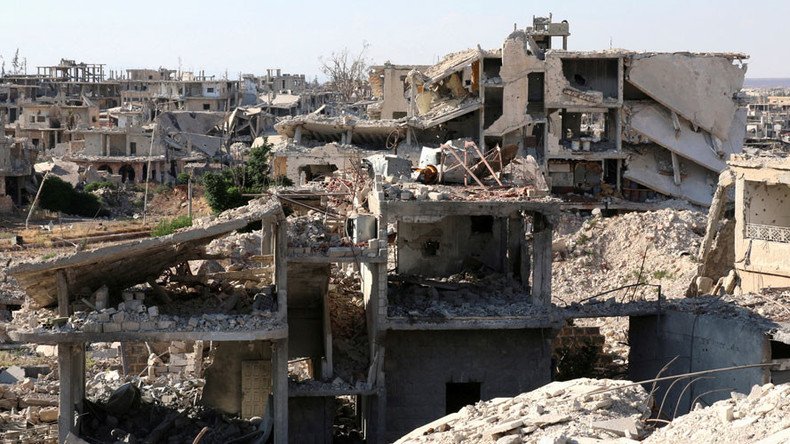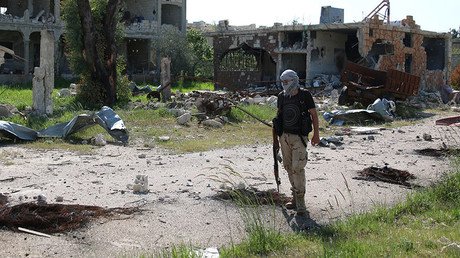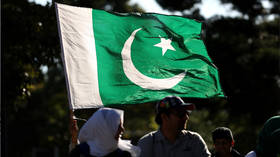‘Red line for Israel, Saudi Arabia & Turkey: President Assad gaining total control of Syria’

The three players, Saudi Arabia, Israel, and Turkey, will try and bring about a scenario, so Syria is divided into different state-lets, explains Middle East expert Ali Rizk. Former UK ambassador to Syria Peter Ford joins the discussion.
The Russian-US brokered ceasefire deal in southern Syria made it possible for locals to enjoy relative peace for the first time in six years.
Russian President Vladimir Putin and US President Donald Trump negotiated the ceasefire at the G20 in Hamburg last week.
However, the peace will be partial, as there are extremist organizations who are outside of the agreement.
Trump ‘knowledgeable’ & ‘skillful negotiator’ says Putin’s spokesman after ‘win-win’ #G20 talks https://t.co/I7rnsGZcOBpic.twitter.com/RQw7DWjrTS
— RT (@RT_com) July 10, 2017
Ali Rizk, Middle East expert
RT: Why do you think this ceasefire would work, where others have failed?
Ali Rizk: I think the Trump administration has put quite a lot of political capital into this particular initiative by Trump after the first meeting with the Russian President, Vladimir Putin. So it kind of comes within a different atmosphere, a very significant new atmosphere, as I said just on the heels of the very important Russian-American summit between the leaders of both countries. That is in my mind one reason.
The other reason: if you read the statement released by the US Secretary of the State Rex Tillerson just on the eve of the US-Russian summit in Hamburg, Tillerson referred to the importance of achieving stability. There appears to be American recognition now, or American readiness, if you would like, to back down from that precondition, which America used to have of President Bashar Assad stepping down.
So I think this new more pragmatic – the Russian President put it best when he said: “This more pragmatic American approach, which no longer sets conditions like the removal of the Syrian President.” This factor does indeed make the chances for this latest ceasefire to be more successful. It increases the likelihood of success because we do indeed appear to have a new American recognition of reality, a more pragmatic, as I said, American approach.
RT: How far away are we from seeing this resolved?
AR: I don’t think you still have a consensus or complete agreement on what the final settlement should be. Do we want to go back to the United Syria, whereby the Syrian president controls all of Syrian territory? For example, in that particular case if the Syrian President Bashar Assad would seize control of all of Syria that is a red line for Israel. Israel obviously would do its utmost to prevent such a scenario from being fulfilled. That is also a red line for Turkey.
At the same time, you have Iran, which believes President Assad should have control of all of Syria, as he is the legitimate Syrian president. Yes, you don’t have a convergence of views as to the final settlement. But at the very least, this particular step is a positive way forward. But I personally would focus on the fact that three players, let me say - Israel, Saudi Arabia, Turkey – these particular three players will do whatever they can in order to spoil any solution, which leaves Syrian President Assad in control of the whole country.
These three players I mentioned would try and bring about a scenario whereby Syria is divided into different state-lets. That is what these three players will be working on. Now, let’s wait and see the if Trump administration will it be influenced by these positions from these countries, especially from Israel or Saudi Arabia, or will it, in the end, agree to the Syrian president controlling all of Syria. That still hasn’t become clear enough.
Russia to continue cooperation with US on de-escalation zones in Syria – Lavrov https://t.co/4zdYkBHwaipic.twitter.com/YXx2LokyCU
— RT (@RT_com) July 10, 2017
‘Freeing up Syrian forces’
Peter Ford, Former UK ambassador to Syria and Bahrain
RT: We’ve seen ceasefires arranged and fail in the past. Why should we be optimistic about this one?
Peter Ford: Yes, I think we should be fairly optimistic. Previous ceasefires failed because there were powerful spoilers. In the Aleppo case, it was Al-Nusra, the Al-Qaeda affiliate, which was very strong and was able to disrupt the ceasefires there. In the south, the military situation is different – most of the fighting forces on the rebel side are smaller groups affiliated with the so-called Free Syrian Army and the Al-Qaeda affiliated groups are very small in numbers.
However, there are pockets of ISIS there. They are not involved in the ceasefire - they will continue to be targeted. Both sides: the Syrian government with Russia behind it, and the rebel side in the southwest with America behind them, want this to work. I’m hopeful that it will hold at least for several months.
#Ceasefire deal brokered by Russia & US enters into force in southwest #Syriahttps://t.co/FLud10g316pic.twitter.com/wOla4HWcSK
— RT (@RT_com) July 9, 2017
RT: Why do you think these three zones were chosen for the ceasefire?
PF: The conditions were ripe; there has been an effective standstill in the area since March when the area was first mentioned as a zone for deconfliction or de-escalation in the Astana talks. There is essentially a military standstill.
The Syrian government could retake the towns at the area, particularly Daraa, but they don’t want to raze Daraa to the ground in the way that the Iraqi government forces, with America behind them, have just razed much of Mosul, and it would be altogether too costly.
At the same time, the rebel forces in the area don’t represent a strategic threat to the Syrian government. The Syrian government has bigger fish to fry in other parts of Syria. This is the real significance of this agreement – it will free up battalions, Syrian government forces, to go fight against ISIS in Deir ez-Zor in the northeast – a much more important town - and other areas in the central spine of the country in Homs province.
The statements, views and opinions expressed in this column are solely those of the author and do not necessarily represent those of RT.













